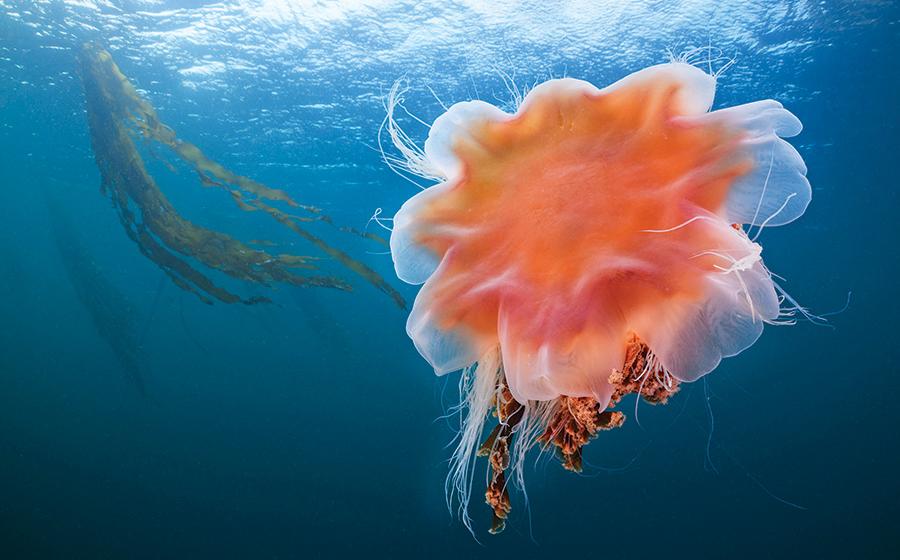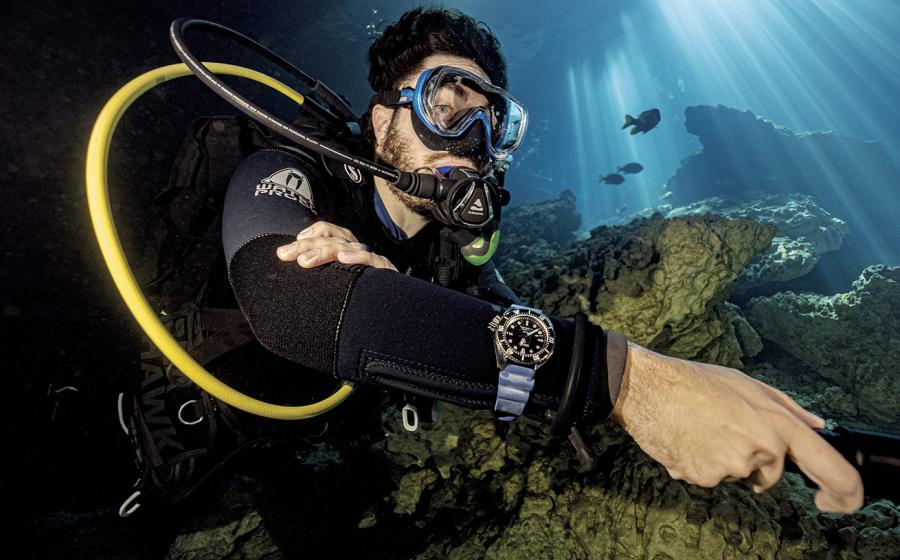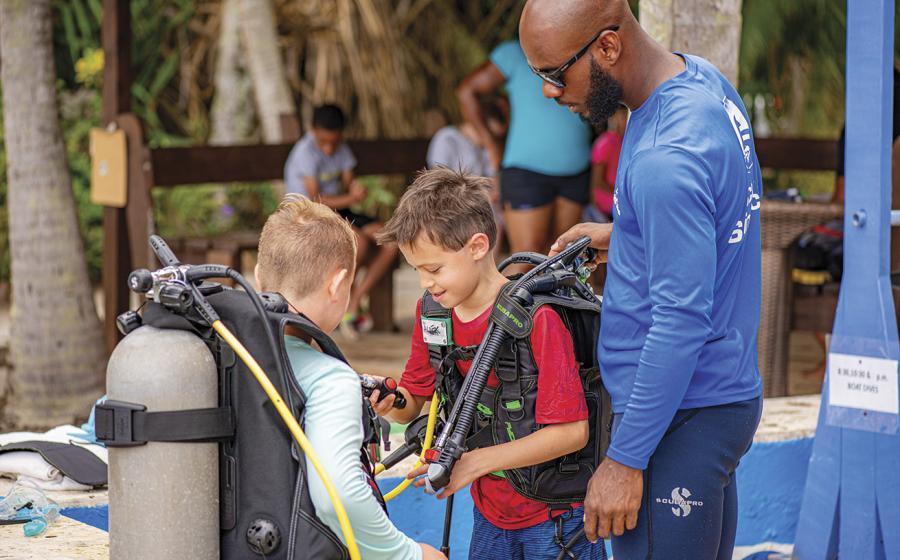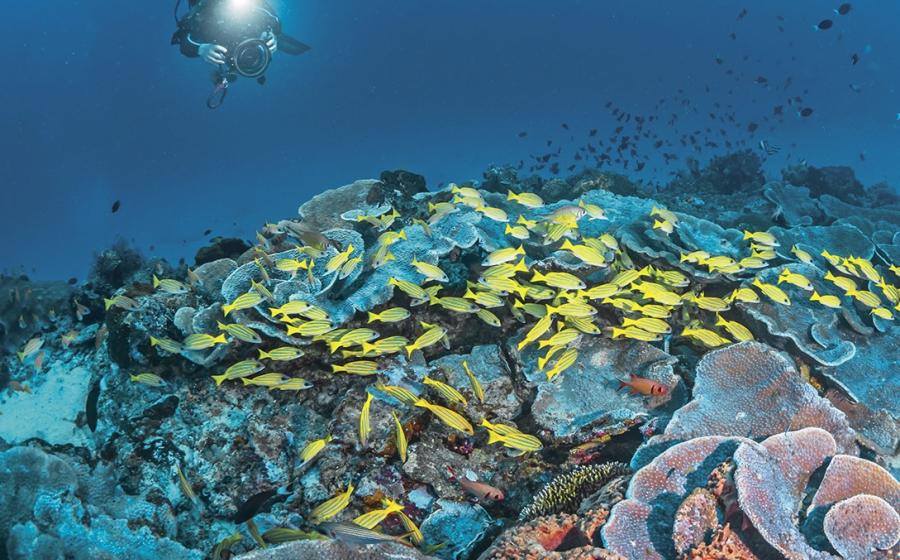You Booze, You Lose

April 2003
By Selene Yeager
Like so many scuba vacations, it was a party in paradise. A small group of divers were making merry the night before an advanced training session in the French Pass, a New Zealand dive site rife with seals, dolphins and spectacular sunsets. The festivities carried on until around midnight, with a few of the revelers bidding adieu with a mighty good buzz. All was on course the next morning (a few raging hangovers notwithstanding) until the tides turned for the worse. The current got strong and three ill-prepared divers were swept away into a dangerously deep pocket of water. Two bodies were recovered; one was never found. The final verdict: A $75,000 fine levied on the dive center for poor judgment and a stern warning about the dangers of drinking and diving.
"The unpredictable nature of scuba is where the real risk lies," says dive doctor Fred Bove, M.D., Ph.D. "Mental incapacitation has been shown with as little as .01 alcohol in your bloodstream--that's less than one drink's worth, and certainly what some heavy drinkers may still have in their systems the morning after. You won't feel impaired at that level. And your hindered judgment won't surface when the seas are calm and the conditions ideal. But if you're suddenly faced with a four-foot chop, that impairment can become critical."
That, says Dr. Bove, is why 40 percent of drownings are alcohol-related. It's also why tight-run operations stick to a policy that your first drink punctuates your last dive--period. Yet, there are still plenty of Margaritaville-style divers who insist on a beer before, during and after their dives. Here's what they're risking with each ebullient hoist.
The "Oops" Response
Scientifically, the biggest risk of boozing and diving is the deterioration of functioning in your anterior cingulate cortex (ACC), the center in your brain that normally detects when you've made an error. This mental mistake monitoring, also known as the "oops response," stops working properly after just one or two drinks (about .04 percent blood alcohol), a level that surprised even the research staff, says University of Amsterdam alcohol researcher Richard Ridderinkhof, Ph.D. "You simply no longer realize that you've made a mistake. What's more, once you've made a mistake, a normally functioning brain will recognize the screw-up and adjust for the error so you don't do it again. This post-error adjustment is virtually gone after drinking alcohol, even moderate amounts," Dr. Ridderinkhof says. So if you mess up your dive plan, your brain won't raise a red flag, setting you up for a trip to the hyperbaric chamber, or worse.
Fact is, alcohol impedes nearly every reflex and reaction you need to dive safely. Even before that Heineken triggers the slightest buzz in your brain, you already have slower reaction time (oops, didn't mean to hit that coral), poorer visual tracking (where the heck did my buddy go?), reduced attention span (where was the boat?), and a falloff in the ability to multitask (uh, inflate BC, clear regulator, check computer, oh, my head. . .). Given the havoc booze wreaks on your brain, it's not surprising that surveys show that active people who are drinkers have a 55 percent injury rate compared to only 24 percent of nondrinkers. The after-effects of a night on the town are equally disturbing. Research shows that being hungover reduces athletic ability by more than 11 percent.
"People make the mistake of thinking scuba isn't a 'sport,'" says diving enthusiast Mary Ann Everhart-McDonald, M.D. "But when you consider the energy it takes to swim against currents, carry heavy gear and climb ladders, it's an intermittently exertion-intensive sport. Being either drunk or hung-over reduces your exercise capacity, putting you and the whole dive boat at risk."
Of Benders and the Bends
Anyone who's ever stood in the restroom line at a college bar knows that what goes in must come out--and then some. Alcohol is a diuretic. In plain English that means you pee more, leading to another D-word--dehydration. "Dehydration not only makes you fatigue faster, it also decreases the amount of blood available for gas exchange and may slow nitrogen removal from your body, leaving you at increased risk for decompression illness," says Dr. Everhart-McDonald.
Alcohol is also a central nervous system depressant, so just as being tipsy makes you less susceptible to the pain of tripping down the stairs, it also can leave you oblivious to symptoms of the bends. Likewise, if you're hungover, you're already feeling crappy and may be less quick to register key symptoms of decompression illness like joint pain, nausea, fatigue, headache and confusion.
"The dehydration, fatigue and lack of judgment make being hungover just as dangerous as being drunk when you're under water," Dr. Everhart-McDonald says.
A Health Hazard Cocktail
Finally, a few too many rum runners can wreak havoc below the surface in ways you've likely never considered. Here are a handful of conditions that arise more easily with alcohol.
Heart disease. Alcohol increases your risk for myocardial ischemia, a condition where blood flow to the heart is restricted, starving your ticker of oxygen and vital nutrients. When blood flow is completely blocked, ischemia can become a heart attack without so much as a pang of warning. "Being submerged in water and scuba diving make the heart work harder to begin with," says Dr. Bove. "If you also have high cholesterol or mild hypertension--and let's face it, many divers do--you can easily be putting yourself at risk for a heart attack by also drinking during your dives." What's more, research shows that simply being hungover may raise your risk for cardiac death.
Hypothermia. Alcohol plays funny tricks on your mind. Aside from making the average Joe think he's Brad Pitt, booze also makes you think you're hotter than you are internally. "Drinking makes your brain think you're overheated, so it dilates the blood vessels in your skin, causing you to lose a lot of heat," says Dr. Bove. "That's fine if you're hanging out at the poolside bar, but it's not if you're spending 30 minutes in 70-degree water." Now you're not only at risk for hypothermia--dangerously reduced body temperature--but as a one-two punch, you're also at increased risk for DCI, since hypothermia decreases blood flow to your extremities, slowing the removal of nitrogen from your body.
Hypoglycemia. Your liver produces less glucose when you've been drinking, increasing your risk of hypoglycemia, or low blood sugar, leaving you feeling weak, drowsy, confused, dizzy and hungry--a litany of symptoms that can put even the best diver in danger.
"Clearly, the best rule to follow is one of zero tolerance," says Dr. Bove. "There should be no alcohol the day you're diving, period. And if you were out the night before sipping cocktails and you wake up feeling woozy, forget it. The ocean will always be there. No dive is worth the risk."
A Prescription for Partygoers
You know the dangers of DUI (diving under the influence), but c'mon, this is a vacation. What's time away from work without a mai tai or two? Here's how to have your drink and your dive, too.
MAKE IT AN EARLY NIGHT. If you have an 8 a.m. dive, set your watch for pumpkin time at 11:30. You should be in bed and falling into sleep well before midnight. If you roll in any later than that, skip the morning dive, and go in the afternoon.
MIX YOUR DRINKS. Limit your drinks the night before to just two or three and have a glass of something nonalcoholic between them.
REHYDRATE. Drink plenty of water or sports drink the morning of your dive to be sure you're well-hydrated.
EAT UP. Don't drink or dive on an empty stomach. Have a good dinner before your cocktails to slow the flow of alcohol into your system, and wake to a healthy breakfast so you have plenty of energy for the day ahead.
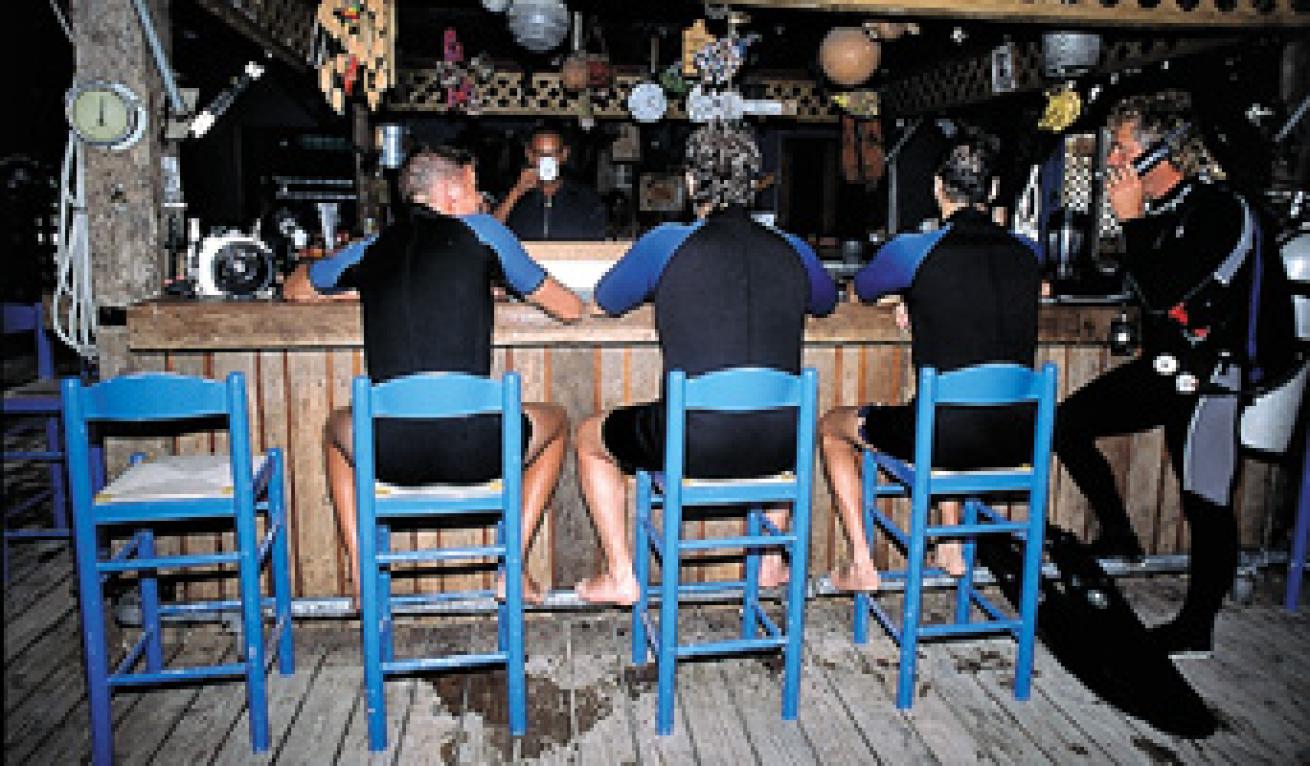
April 2003
By Selene Yeager
Like so many scuba vacations, it was a party in paradise. A small group of divers were making merry the night before an advanced training session in the French Pass, a New Zealand dive site rife with seals, dolphins and spectacular sunsets. The festivities carried on until around midnight, with a few of the revelers bidding adieu with a mighty good buzz. All was on course the next morning (a few raging hangovers notwithstanding) until the tides turned for the worse. The current got strong and three ill-prepared divers were swept away into a dangerously deep pocket of water. Two bodies were recovered; one was never found. The final verdict: A $75,000 fine levied on the dive center for poor judgment and a stern warning about the dangers of drinking and diving.
"The unpredictable nature of scuba is where the real risk lies," says dive doctor Fred Bove, M.D., Ph.D. "Mental incapacitation has been shown with as little as .01 alcohol in your bloodstream--that's less than one drink's worth, and certainly what some heavy drinkers may still have in their systems the morning after. You won't feel impaired at that level. And your hindered judgment won't surface when the seas are calm and the conditions ideal. But if you're suddenly faced with a four-foot chop, that impairment can become critical."
That, says Dr. Bove, is why 40 percent of drownings are alcohol-related. It's also why tight-run operations stick to a policy that your first drink punctuates your last dive--period. Yet, there are still plenty of Margaritaville-style divers who insist on a beer before, during and after their dives. Here's what they're risking with each ebullient hoist.
The "Oops" Response
Scientifically, the biggest risk of boozing and diving is the deterioration of functioning in your anterior cingulate cortex (ACC), the center in your brain that normally detects when you've made an error. This mental mistake monitoring, also known as the "oops response," stops working properly after just one or two drinks (about .04 percent blood alcohol), a level that surprised even the research staff, says University of Amsterdam alcohol researcher Richard Ridderinkhof, Ph.D. "You simply no longer realize that you've made a mistake. What's more, once you've made a mistake, a normally functioning brain will recognize the screw-up and adjust for the error so you don't do it again. This post-error adjustment is virtually gone after drinking alcohol, even moderate amounts," Dr. Ridderinkhof says. So if you mess up your dive plan, your brain won't raise a red flag, setting you up for a trip to the hyperbaric chamber, or worse.
Fact is, alcohol impedes nearly every reflex and reaction you need to dive safely. Even before that Heineken triggers the slightest buzz in your brain, you already have slower reaction time (oops, didn't mean to hit that coral), poorer visual tracking (where the heck did my buddy go?), reduced attention span (where was the boat?), and a falloff in the ability to multitask (uh, inflate BC, clear regulator, check computer, oh, my head. . .). Given the havoc booze wreaks on your brain, it's not surprising that surveys show that active people who are drinkers have a 55 percent injury rate compared to only 24 percent of nondrinkers. The after-effects of a night on the town are equally disturbing. Research shows that being hungover reduces athletic ability by more than 11 percent.
"People make the mistake of thinking scuba isn't a 'sport,'" says diving enthusiast Mary Ann Everhart-McDonald, M.D. "But when you consider the energy it takes to swim against currents, carry heavy gear and climb ladders, it's an intermittently exertion-intensive sport. Being either drunk or hung-over reduces your exercise capacity, putting you and the whole dive boat at risk."
Of Benders and the Bends
Anyone who's ever stood in the restroom line at a college bar knows that what goes in must come out--and then some. Alcohol is a diuretic. In plain English that means you pee more, leading to another D-word--dehydration. "Dehydration not only makes you fatigue faster, it also decreases the amount of blood available for gas exchange and may slow nitrogen removal from your body, leaving you at increased risk for decompression illness," says Dr. Everhart-McDonald.
Alcohol is also a central nervous system depressant, so just as being tipsy makes you less susceptible to the pain of tripping down the stairs, it also can leave you oblivious to symptoms of the bends. Likewise, if you're hungover, you're already feeling crappy and may be less quick to register key symptoms of decompression illness like joint pain, nausea, fatigue, headache and confusion.
"The dehydration, fatigue and lack of judgment make being hungover just as dangerous as being drunk when you're under water," Dr. Everhart-McDonald says.
A Health Hazard Cocktail
Finally, a few too many rum runners can wreak havoc below the surface in ways you've likely never considered. Here are a handful of conditions that arise more easily with alcohol.
Heart disease. Alcohol increases your risk for myocardial ischemia, a condition where blood flow to the heart is restricted, starving your ticker of oxygen and vital nutrients. When blood flow is completely blocked, ischemia can become a heart attack without so much as a pang of warning. "Being submerged in water and scuba diving make the heart work harder to begin with," says Dr. Bove. "If you also have high cholesterol or mild hypertension--and let's face it, many divers do--you can easily be putting yourself at risk for a heart attack by also drinking during your dives." What's more, research shows that simply being hungover may raise your risk for cardiac death.
Hypothermia. Alcohol plays funny tricks on your mind. Aside from making the average Joe think he's Brad Pitt, booze also makes you think you're hotter than you are internally. "Drinking makes your brain think you're overheated, so it dilates the blood vessels in your skin, causing you to lose a lot of heat," says Dr. Bove. "That's fine if you're hanging out at the poolside bar, but it's not if you're spending 30 minutes in 70-degree water." Now you're not only at risk for hypothermia--dangerously reduced body temperature--but as a one-two punch, you're also at increased risk for DCI, since hypothermia decreases blood flow to your extremities, slowing the removal of nitrogen from your body.
Hypoglycemia. Your liver produces less glucose when you've been drinking, increasing your risk of hypoglycemia, or low blood sugar, leaving you feeling weak, drowsy, confused, dizzy and hungry--a litany of symptoms that can put even the best diver in danger.
"Clearly, the best rule to follow is one of zero tolerance," says Dr. Bove. "There should be no alcohol the day you're diving, period. And if you were out the night before sipping cocktails and you wake up feeling woozy, forget it. The ocean will always be there. No dive is worth the risk."
A Prescription for Partygoers
You know the dangers of DUI (diving under the influence), but c'mon, this is a vacation. What's time away from work without a mai tai or two? Here's how to have your drink and your dive, too.
MAKE IT AN EARLY NIGHT. If you have an 8 a.m. dive, set your watch for pumpkin time at 11:30. You should be in bed and falling into sleep well before midnight. If you roll in any later than that, skip the morning dive, and go in the afternoon.
MIX YOUR DRINKS. Limit your drinks the night before to just two or three and have a glass of something nonalcoholic between them.
REHYDRATE. Drink plenty of water or sports drink the morning of your dive to be sure you're well-hydrated.
EAT UP. Don't drink or dive on an empty stomach. Have a good dinner before your cocktails to slow the flow of alcohol into your system, and wake to a healthy breakfast so you have plenty of energy for the day ahead.

